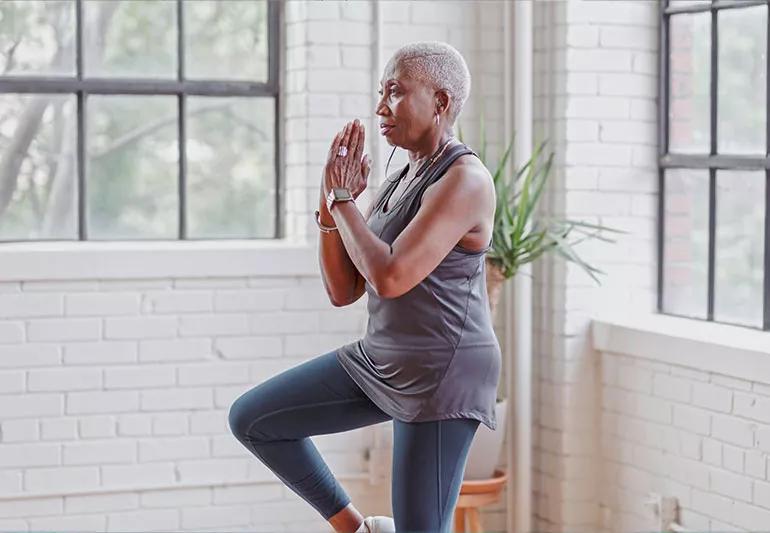Here’s what to do and how to heal after you’ve had a heart attack

The phrase “serious as a heart attack” exists for a reason: Heart attacks are a medical emergency that can impact your entire life — and can be deadly. But by adopting healthy lifestyle changes and closely following your doctor’s guidance, you can play an enormous role in your recovery and help prevent future heart attacks.
Advertisement
Cleveland Clinic is a non-profit academic medical center. Advertising on our site helps support our mission. We do not endorse non-Cleveland Clinic products or services. Policy
Interventional cardiologists Leslie Cho, MD, and Grant Reed, MD, talk about what to expect after a heart attack, including after-effects, lifestyle changes, mental health and more.
“A heart attack should be treated like a life-changing experience,” Dr. Reed says, “and taking an active role in your health can help aid your recovery.”
According to the American Heart Association, 1 in 5 people who has a heart attack is readmitted to the hospital for a second one within five years. But with proper self-care and a focus on your health, you can lower your risk of recurrence.
“Following a heart-healthy diet and lifestyle, taking your medications as prescribed, stopping tobacco use, and participating in cardiac rehabilitation can maximize your chances for recovery after a heart attack,” he says.
Most people can return to work or resume their usual activities two weeks to three months after a heart attack. But your individual recovery time is dependent on a number of factors, including:
“The most common reason for a heart attack is a sudden blockage of a heart artery,” Dr. Reed explains. “The effects that the heart attack has on your heart generally depend on how large of a vessel is blocked and for how long.”
Advertisement
Patients who are treated quickly and properly may have fewer symptoms and long-term consequences, which is why it’s so important to know the signs of a heart attack and to seek immediate medical attention if you think you’re having one.
Once doctors have confirmed that you’re having (or have had) a heart attack, you’ll be taken to the cardiac catheterization laboratory.
“The most effective treatment for a heart attack is a heart catheterization, at which time the blocked blood vessel can be opened with a balloon and a stent placed to keep the artery open permanently,” Dr. Reed says. “The sooner this happens, the better your overall prognosis.”
In the hours after a heart attack, you may experience:
These symptoms usually improve within the first day but can last longer if heart failure — a weakness of the heart muscle or valves — develops.
It’s also common for survivors to experience mental health struggles in the wake of their heart attack. (More on that in a moment.)
Barring complications, most people spend two days to one week in the hospital afterward. But your recovery is just beginning.
In the days and weeks following your heart attack, you’ll be under careful observation by your healthcare providers, who want to make sure you’re recovering and adopting heart-healthy habits that will lessen your likelihood of a future heart attack.
“A heart attack is a serious event, but most patients can return to a good quality of life afterward,” Dr. Reed says. “It may take a few weeks for you to feel like yourself again, though.”
Upon leaving the hospital, you’ll be enrolled in a cardiac rehabilitation program, designed to get you on the road to heart health through weight management, nutrition, exercise and risk reduction.
“Studies show that patients who participate in cardiac rehab tend to have a better quality of life and live longer after having a heart attack,” Dr. Reed says.
Cardiac rehabilitation, which is typically 36 sessions long, is an outpatient program of supervised exercise, guided by an exercise physiologist. In cardiac rehab, you’ll learn a variety of heart-healthy habits.
Exercise is a critical element of heart attack recovery and living a heart-healthy life. In cardiac rehab, you’ll be monitored for symptoms and heart rhythm changes during your exercise, and you’ll track your progress over time.
First, you’ll determine your functional capacity (your ability to perform daily activities that require you to physically exert yourself), which is compromised after a heart attack.
“You’ll get on a treadmill so medical professionals can see what your functional capacity is, and then you’ll try to increase that number by about 20%,” Dr. Cho explains. “By the end of cardiac rehab, we want you to be exercising most days of the week for at least 30 minutes a day.”
Advertisement
“Dietary changes to minimize saturated fats and cholesterol and to reduce salt intake are essential,” Dr. Reed says. The Mediterranean Diet, which is considered the heart-healthiest style of eating, promotes:
Chronically high blood pressure is directly linked to cardiovascular disease, but weight loss, exercise, lowered salt intake and prescription medications can all help lower your blood pressure.
“Getting your blood pressure to a goal of <130/80 mmHg can help reduce stress on the heart and the future risk of a heart attack and stroke in the future,” Dr. Reed says.
Eating a healthy diet and exercising more may help you to lose weight, which is also associated with a healthier heart.
“Weight loss to a goal BMI target under 25 kg/m2 may also reduce the risk of cardiovascular events and improve quality of life,” Dr. Reed says.
“People underestimate the amount of mental trauma that a heart attack causes,” Dr. Cho says. “It’s a lot for patients and their families to deal with.”
Studies show that people who have heart disease are more likely to develop depression than those who don’t, which makes it all the more crucial to protect your mental health after a heart attack.
Advertisement
Don’t ignore changes in your mood, and be on the lookout for symptoms of depression, including:
If you start to experience these feelings, reach out to your healthcare provider to discuss them.
Cardiac rehab will also teach you stress reduction techniques to try to improve your mental and emotional wellness and lessen your chances of a future heart attack.
“You’ll learn behavior modification techniques, including how to breathe and how to manage your stress and your anger,” Dr. Cho says. “That’s one of the reasons why study after study shows that people in cardiac rehab live longer after a heart attack than people who don’t do cardiac rehab.”
The facts don’t lie: It’s vital to quit smoking after you’ve had a heart attack. Seek help from your healthcare provider if you need help kicking the habit.
People who smoke are four times more likely to die of heart disease than non-smokers, and studies show that smokers who resume the habit after a heart attack are three times more likely to die than those who quit.
After a heart attack, you can expect to be put on a number of medications to maximize your heart function and minimize the chance of a future heart attack. These may also include cholesterol-lowering medications such as statins or PCSK9 inhibitors.
And while it’s common for heart attack patients to feel upset about suddenly being on multiple medications, try to focus on the overall objective — your health.
Advertisement
“Sometimes people fixate on the number of medications they’re on, comparing themselves to people they know who aren’t on any,” Dr. Cho says. “But it’s not about how many medications you’re on. It’s about doing what you need to do to live a long, high-quality life.”
When you’re recovering from a heart attack, it’s important that you follow your healthcare providers’ instructions and not skip any appointments. Your doctor will monitor your progress to determine how often you need to return to the office.
“After finishing cardiac rehab, most people are seen by their cardiologist every three months for the first year, and then every six months, and then eventually you’ll get down to once a year,” Dr. Cho says.
With improved prevention and rehabilitation, as well as advances in treatments, you can recover from a heart attack and go on to live a healthy, happy and fulfilled life for many years to come.
“Heart attacks used to be a death sentence, but they’re not anymore — not if you take good care of yourself,” Dr. Cho says. “A heart attack doesn’t have to mean the end. It could mean a new beginning.
Learn more about our editorial process.
Advertisement

There’s no way to stop a heart attack on your own — call for help immediately

Healthy choices involving food, exercise and more can help reduce your risk

Recognizing subtle symptoms, like unusual fatigue or fleeting episodes of chest pain, could be key to survival

Common symptoms include chest discomfort, shortness of breath, nausea and profuse sweating

Calling 911 or emergency services should always be your first step

Mild heart attacks may cause less damage, but they can still lead to serious complications and require medical attention

Congenital heart disease, genetic conditions and unhealthy lifestyle habits can put teens at higher risk for heart attack

Absolutely! In fact, in many ways, exercise is key to recovery

Wearing a scarf, adjusting your outdoor activities and following your asthma treatment plan can help limit breathing problems

Your diet in the weeks, days and hours ahead of your race can power you to the finish line

When someone guilt trips you, they’re using emotionally manipulative behavior to try to get you to act a certain way